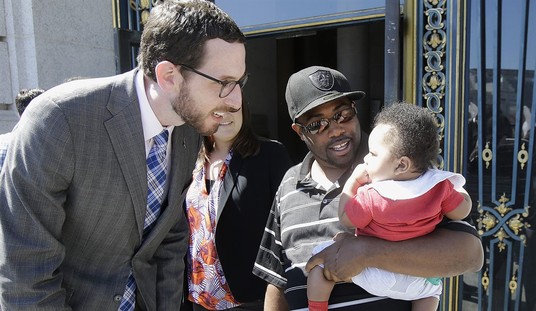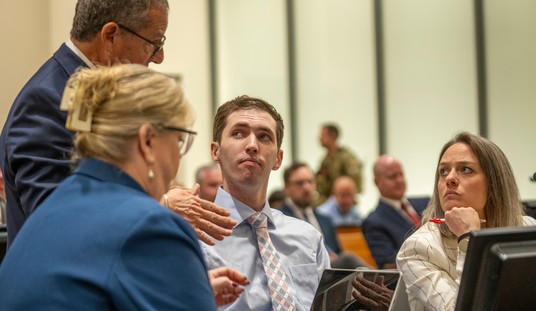On the one hand, three former generals in cabinet, or cabinet-level, positions? And not just any cabinet positions but key national security positions. Trump will have Mike Flynn as NSA, James Mattis at Defense, and now John Kelly at DHS. There’s a chance (but a diminishing one) that Adm. Mike Rogers will end up as DNI too, which would leave Jeff Sessions as the only cabinet member in a counterterror leadership role who isn’t a former military officer. All this from a guy known for saying things during the campaign like “I know more about ISIS than the generals do” and “Under the leadership of Barack Obama and Hillary Clinton the generals have been reduced to rubble.”
I like Trump’s thinking on this, though, even while I understand that it could be used in theory to justify nominating only retired military officers to natsec posts:
In 2010, General Kelly earned a painful distinction when his son, Lt. Robert Michael Kelly, was killed after stepping on a mine while leading a platoon in Afghanistan. General Kelly became the highest-ranking military officer to lose a son or daughter in Iraq or Afghanistan.
General Kelly has said little about that experience, but it played a role in his selection by Mr. Trump, according to people close to the Trump transition. Mr. Trump, his aides said, wanted people on his national security team who understood personally the hazards of sending Americans into combat.
DHS wouldn’t have a say on sending troops into combat but Kelly would be involved in all major natsec discussions. According to this Military Times profile of him, which is worth your time, he’s sufficiently well regarded by other officers that Mattis actually suggested him for Secretary of Defense (and vice versa). His key credential is that he used to lead Southern Command, which includes everything from the prison at Guantanamo Bay — Kelly is a strong advocate for it — to Central and South America. Which, as it turned out, provided him with some key experience for an eventual transition to DHS:
In that role, Kelly worked closely with several federal and nongovernmental agencies. Many of the larger ones, including Customs and Border Protection, Immigration and Customs Enforcement, the U.S. Coast Guard, operate under the aegis of the Department of Homeland Security.
And if not Kelly, whoever heads up Homeland Security or State may be hard-pressed to match the general’s wealth of contacts in this part of the world, and his depth of understanding about the socioeconomic and geopolitical dynamics there. The source close to Kelly said the general has “better relationships in Latin American than the State Department does.”
Kelly is a drug warrior, one who’s apparently okay with medical marijuana but fiercely opposed to wider legalization. That’s alsodue in part to his time at Southern Command. He said of America’s drug habit to Military Times that “if [Americans] understood what it’s doing to Honduras or El Salvador, or what it was doing to Colombia, I think they’d responsibly realize that this is not a good thing.” As it happens, Jeff Sessions is also a drug warrior, one who looks dimly on the idea of the feds deferring to state law where marijuana is legal. Between the two of them, if you’re libertarian-minded on the drug war, you’re in for a rough four years.
On the other hand, the fact that Kelly has spent parts of his career fighting terrorists in Iraq and drug cartels and narco traffickers in Central America means this is probably true:
Bigger story than two generals in the cabinet is that Trump is focused more on terrorism > immigration. Kobach was contender for DHS.
— Josh Kraushaar (@HotlineJosh) December 7, 2016
Pairing Kris Kobach, one of the GOP’s most high-profile border enforcers, at DHS with Sessions at DOJ would have signaled that Trump is ready to make immigration top priority. Kelly told Military Times that he agrees that the U.S. has a right to strengthen its borders, but it seems his big-picture solution to the illegal immigration problem is to attack it at the source. The more hospitable Mexico, Latin America, and Central America are to their citizens, the less incentive there is for people to make a run for the border. Two years ago he helped broker a $1 billion package by the U.S. for Guatemala, Honduras, and El Salvador to fund anti-trafficking efforts and promote economic development. That’s not to say he won’t be a loyal soldier in enforcing the law, just to say that he’s likely to prioritize terrorism and drug trafficking over deporting America’s broader illegal population.
There’s something else to like about Kelly. He comes with the Bob Gates seal of approval for candor:
Former Defense Secretary Robert Gates, for whom Kelly worked as a senior military adviser in 2011, told Military Times that the general’s candidness was an asset at the Pentagon…
[Kelly:] “I’ve learned that, in many cases, people say ‘I want ground truth’ and they don’t really mean it. There are warts all over this organization, as there are in many organizations, but you just have to tell truth to power and let the chips fall where they may. I know a lot of people may read that, if you put it in your story, and say ‘easy for him; he’s a four-star.’ But I would say some of the most challenging periods in my life, as a Marine officer, have been fairly recently, where you get into that civilian-military thing and the truth is not always welcome. It can cause some heartburn when you get a call from certain people in Washington who say ‘it’s probably not a good idea to go down that road anymore.’ But I say ‘hey, that’s the truth. I’m at a congressional hearing, and they asked me a question. What am I going to do, lie?'”
He and Mattis each have reputations as independent thinkers and honest advisors, which neutralizes most of the objections to having so many former generals in the cabinet. It’s one thing for the strongman Trump to surround himself with yes-men military officers. It’s another thing for him to surround himself with officers who know what they’re doing and aren’t afraid to tell him when he’s wrong. Not what I would have expected from Trump, but then I wouldn’t have expected him to put aside his personal feelings and consider Romney for a key job. It’s to his credit that he’s open to people who clearly aren’t always going to tell him what he wants to hear. Let’s hope he reacts well when they start doing that in practice.
One other policy note on Kelly. He’s a strong critic of Obama’s Iran policy, as is Mattis. If there was any doubt before that Trump’s administration will be more willing to confront Iran than O’s was, there isn’t anymore.








Join the conversation as a VIP Member